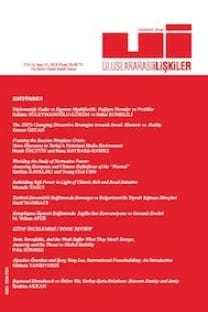Arjantin’in Yeni Kalkınmacı Dönüşü: Mercosur ile Bütünleşmede Yeni bir Yaklaşım
Bu makale, 2001/2002 ekonomik krizinden sonraki dönemde, Arjantin’in Güney Amerika Ortak Pazarı’na (Mercosur) yönelik ticaret politikalarını incelemekte ve bu politikaların kalkınma açısından sahip olduğu potansiyeli analiz etmektedir. Geçtiğimiz on yılda, Latin Amerika uzmanları ulusal ve bölgesel kalkınmacı hedeflerin bölgede yeniden ortaya çıkmasıyla, bölgesel bütünleşme için yeni bir siyasi, ekonomik ve sosyal gündemin oluştuğuna işaret ettiler. Araştırmalar büyük ölçüde iç ve siyasi etkenlerin üzerinde yoğunlaşırken, bölgesel bütünleşme projeleri ve küreselleşme arasındaki ilişkiye yeterli ilgi gösterilmemiştir. Yeni bölgeselleşme literatüründen yola çıkarak, bu makale bölgesel bütünleşme projelerinin iç ve dış etkenler arasında katı bir ayrım yapılmadan ele alınmasını savunmaktadır. Bu makalenin temel savı, Arjantin’in bölgesel bütünleşmeye yönelik çabalarının dünya ekonomisindeki küreselleşme ve liberalleşme süreçleri bağlamında Mercosur üyelerinin farklılaşan kalkınma öncelikleri ve Mercosur’a ilişkin yaklaşımları ve var olan farklı kalkınma düzeyleri nedeniyle güçlü bir kalkınmacı potansiyel ile sonuçlanmadığını göstermektedir.
Anahtar Kelimeler:
Yeni Kalkınmacılık, Mercosur, Arjantin, Yeni Bölgeselleşme, Latin Amerika
Argentina’s Neo-developmental Turn: A New Approach towards Integration with Mercosur
This article explores the nature of the political economy of Argentina’s trade policies towards Mercado Común del Sur (Mercosur – the Southern Common Market) after the financial crisis of 2001/2002 and analyses to what extent they constitute a robust potential for development. In the past decade, scholars of Latin America have argued that the reactivation of national and regional developmental goals in this region have resulted in the development of a new political, economic and social agenda for regional integration because open regionalism had failed to respond to the challenges of stable growth. Although the existing literature on regionalism has explored the internal and political dynamics of the recent efforts to cooperate in the region, there has not yet been adequate attention given to the link between regionalist projects and processes of globalisation. By using the analytical tools of the literature on new regionalism, this article argues that there is a need to go beyond stark distinctions between domestic and external dynamics of regionalist projects. The main argument of this article suggests that Argentina’s developmental efforts were restricted by divergent understandings of Mercosur and development priorities; and asymmetries of production that prevailed among the bloc’s members in the context of a more globalised and liberalised world economy.
Keywords:
Neo-developmentalism, Mercosur, Argentina, New Regionalism, Latin America,
___
- ........
- ISSN: 1304-7310
- Başlangıç: 2004
- Yayıncı: Uluslararası İlişkiler Konseyi Derneği İktisadi İşletmesi
Sayıdaki Diğer Makaleler
Kabiliyetler ve Dış Politika: Türkiye’nin Küçük ve Orta Düzeyde Güç Statüsünün Karşılaştırılması
Kapsamlı Ortak Eylem Planı ve İran’ın Nükleer Programının Geleceği
Haklı Savaş, Haksız Savaş: Tarihten Örneklerle Desteklenmiş Ahlaki Bir Tez
Barış Harekatlarının Gelişimi ve Kosova Misyonu
Arjantin’in Yeni Kalkınmacı Dönüşü: Mercosur ile Bütünleşmede Yeni bir Yaklaşım
Metodolojik Ulusçuluk ve Türkiye’de Dış Politika Çalışmaları
Nuno P. MONTEİRO, Theory of Unipolar Politics
Michael WALZER, Haklı Savaş, Haksız Savaş:Tarihten Örneklerle Desteklenmiş Ahlaki Bir Tez
